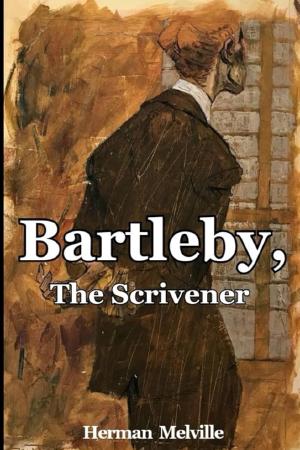Bartleby, the Scrivener by Herman Melville

I can see that figure now—pallidly neat, pitiably respectable, incurably forlorn! it was Bartleby
Subtitled as “A Story of Wall Street”, it’s one of the most famous stories of Herman Melville, published a few years after the colossal Moby-Dick. Even though it’s a short story with an undoubtedly simple plot, its interpretation might be the most challenging to grasp, with critics having very different interpretations. Based on the financial street of New York, the narrator, an unnamed head of a law firm hires a young scrivener to perform the functions of a legal document copyist. At the beginning, this new copyist called Bartleby doesn’t seem to be very different from the other copyists who already work at the law firm. Furthermore, he even demonstrates good performance at work, creating high-quality work at a faster pace than his colleagues. It wasn’t until one ordinary, uneventful day that the busy lawyer enlisted Bartleby’s help, that the words that would define Bartleby’s spiritual motto were first uttered in a singularly mild, firm voice: “I would prefer not to”.
From that moment on, and without any reason, this would be the answer to all of Bartleby’s requests, causing annoyance to the rest of the copyists and disconcerting the lawyer, who eventually referred to his attitude as “passive resistance”. Always with a calm and polite attitude, but at the same time firm, Bartleby continues to reject even the most simple and routine task—despite apparently remaining in the office all the time available—, including questions of personal nature, as if it were the only learned message that he was able to articulate, and until eventually being reduced to a pale figure looking out upon a “dead brick wall”.
What a miserable friendlessness and loneliness are here reveled! His poverty is great; but his solitude, how horrible!
One Sunday, when the lawyer was settling some matters and decided to go to the office, he realized that Bartleby had been living there. It is then that the lawyer, in an attempt to ease the tension between the copyists, and in turn, showing some mercy to Bartleby, decides to move the law firm to a new building. However, some time later he learns that Bartleby remains in the office without caring about the new owners, and despite his attempts to reason with him, Bartleby ends up being evicted and sent to a police cell. The worried lawyer visits Bartleby to look after him, but after a short visit, later learns that he has died of starvation caused by the extreme stance of rejecting everything.
The reasons for Bartleby’s behavior have never been clear, and is the subject of, as I mentioned at the beginning, many conjectures on the part of critics. At the end of the book, the lawyer knows of a vague report that Bartleby had been working in the dead letter office, suggesting that this may have deeply affected him after reading letters meant for those who were gone. After knowing the story, it is also worth asking about the moral role of the lawyer to the extent, that a moral dilemma could be examined to determine whether he did what he could to help Bartleby, or gave in to the importance of material goods, putting empathy and charity aside.
As we can see, the story is minimal, and practically nothing happens. In fact, besides Bartleby and the lawyer, there are only three other characters who have even a reasonable portrayal—the other copyists: Turkey, Nippers and Ginger Nut. Melville’s style throughout the story results in a slow, descriptive development, using simple language that only accelerates in the few short moments where the story reaches its climax. Bartleby is portrayed as a mysterious and profoundly isolated character. His disconnection with the work and eventually, with life itself accentuates how detached he has become from the world. As he begins to avoid human contact until he stares blankly at the brick wall, it suggests a dehumanization that is, however, difficult to explain.
I might give alms to his body, but his body did not pain him; it was his soul that suffered, and his soul I could not reach
Bartleby’s absolute refusal to perform any tasks, to the point of rejecting life itself, would seem to show some kind of internal rebellion that expresses its nature in a quiet and even polite protest, but it is worth asking why it exists and what it is directed towards. In this regard, I think it’s difficult not to see Bartleby’s story through an existentialist lens, preceding all the great works that later defined the genre. Perhaps his protest is a muffled cry aimed at denouncing an empty existence personified in the modern day laborer where the only meaning would seem to be material production—in this sense, Melville’s selection of Wall Street as a set would be revealing.
Melville offers no easy answers, and Bartleby stays as a stubborn figure where indifference and alienation remove a man from the world who can no longer consider it his own, leaving readers with an ambiguous story that resists any definitive interpretation, and wondering about the implications of its denial.